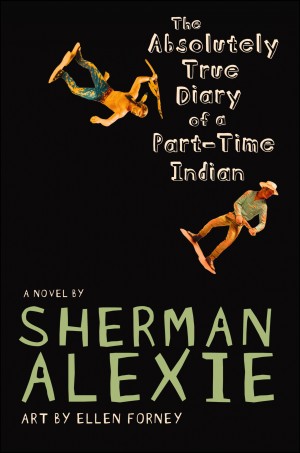 Here’s some good news to start the week: The school board in Grants Pass, Oregon has approved Sherman Alexie’s Absolutely True Diary of a Part-Time Indian for use in 10th-grade English classes after it was initially rejected by the district’s curriculum council. Each board member read the entire book, and all but one “found the subject matter not nearly as objectionable as they had been led to believe.”
Here’s some good news to start the week: The school board in Grants Pass, Oregon has approved Sherman Alexie’s Absolutely True Diary of a Part-Time Indian for use in 10th-grade English classes after it was initially rejected by the district’s curriculum council. Each board member read the entire book, and all but one “found the subject matter not nearly as objectionable as they had been led to believe.”
As required by district policy, a group of five English teachers asked the curriculum council in April to approve Absolutely True Diary and another frequently challenged book, Laurie Halse Anderson’s Speak, for use in the classroom. At its meeting on May 29 the curriculum council, made up of district staff, administrators, and parents, approved Speak without batting an eye but rejected Absolutely True Diary. According to their assessment, the book “deals with sexual, graphic material related to the behavior of adolescent boys” and contains “bad language on nearly every page.” Because they expected it “would definitely be challenged in the future,” the council thought it best not to approve Absolutely True Diary in the first place.
Fortunately this decision based on something that might happen in the future was not the final word. After the curriculum council communicated its recommendations to the school board at a June 10 meeting, the board members agreed they would each read the book before rendering a final judgment at their next meeting. With five members present at that meeting last Tuesday, all but one said the book was just fine for classroom use as long as students and parents are offered an alternate assignment. Board member Gary Penning, who previously lived near the reservation where the book is set, even offered high praise: “I found it fascinating,” he said. “It’s a great book.” His colleague Cliff Kuhlman was not as enthusiastic, but said he “can’t figure out why it would be banned” even though he thought it was boring.
Although it may seem unremarkable that a school district actually followed its own procedures, this case is in sharp contrast to some others that we’ve seen recently, both in Florida. First, there was the Pensacola high school principal who cancelled an entire summer reading program rather than have students read Cory Doctorow’s Little Brother, and then a few weeks later, someone in the central office of the Pasco County School District quietly removed John Green’s Paper Towns from an eighth grade reading list over a weekend. In both cases, the school districts had policies set up to deal with book challenges but they were ignored. The Grants Pass example is a perfect illustration of why such policies usually include multiple levels of review, and why it’s important to follow the policy with every book. Kudos to the Grants Pass school board for seeing past the hyperbole that now surrounds Absolutely True Diary and taking the time to consider the book objectively!
Please help support CBLDF’s important First Amendment work by making a donation or becoming a member of the CBLDF!
Contributing Editor Maren Williams is a reference librarian who enjoys free speech and rescue dogs.